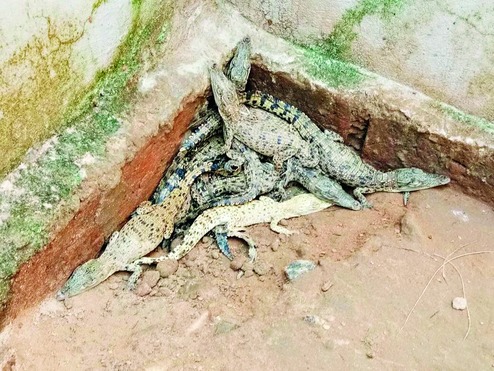
Paradip: Artificially bred estuarine white crocodile babies have emerged out of eggshells in the Bhitarkanika National Park.
The sight of the baby crocs breaking out of eggshells and their act of loitering aimlessly around the enclosure of the breeding centre is a visual treat for animal lovers, said a forest official.
Out of the baby crocodiles that emerged from their nests in captivity in August last, about six to seven were found to be the albino ones. At the time of their birth, they did not appear white in colour. However, they started showing traits of albino crocodiles after four months.
Earlier this year, wildlife enumerators spotted around a dozen of highly threatened albino salt-water crocodiles in the brackish water bodies and water inlets along the wetlands of the national park during a census. The white species were under sub-adult and adult categories with one of it tentatively measuring 14 feet long.
"The birth of white crocodiles bred artificially is a positive development. These crocodiles are vulnerable to being eaten by many predators in the wild. The fledging period is a high-risk stage of the lifecycle of crocodiles. These species will be released to water bodies in the wild once they grow two years old. After they turn juvenile, the risk of predation in the wild reduces," said forest range officer Akshyaya Kumar Nayak.
"Out of 500 baby crocodiles, only one crocodile reaches adulthood. So, the captive born crocodiles are released in the juvenile period to reduce mortality," said Sudhakar Kar, crocodile expert and former senior research officer of the state's forest and wildlife department.
The rear and release of these hatched reptiles has been going on since 1975, funded by the United National Development Programme and the Food and Agriculture Organisation. The conservation project undertaken in Bhitarkanika has been a success, while a similar crocodile conservation project launched simultaneously in Angul district's Tikarpada Sanctuary was not a success.










